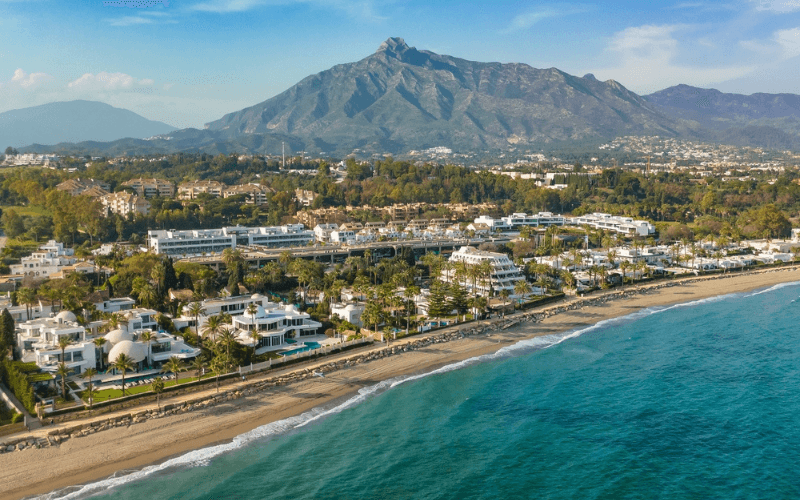Moving to Spain after Brexit: A real possibility or just a pipedream?
Let’s face facts. For Brits interested in moving to Spain, Brexit didn’t make things any easier – but it’s not as tricky as you might think.
It’s been over 4 years since the UK left the EU (European Union) and it’s a topic that has received a lot of attention in the media. Yet, there’s still much confusion regarding whether it’s possible to move to the Costa del Sol – and, if so, how the process works.
True, UK nationals no longer have the same freedom of movement they once had. But the reality is, since 2020, thousands of expats have successfully managed to relocate and start their dream life on the Sunshine Coast – and there’s absolutely no reason why you can’t do the same.
At Bromley Estates Marbella, we have over a decade of experience in dealing with both EU and non-EU property transactions – as well as exceptional knowledge in this complex area.
Here, our in-house specialists debunk the five biggest myths about moving to Spain after Brexit. So why not read on? Get rid of all those misconceptions, grab your brand new non-EU passport and take the first step towards owning your property in the sun.
5 myths about moving to Spain post-Brexit
It’s impossible for a UK national to relocate to Spain
This is simply not true.
Moving to Spain is still 100% possible – it just requires a bit more planning and paperwork.
Due to Brexit, Brits no longer have ‘freedom of movement’. This doesn’t affect your right to buy property, but it does limit the length of time you can spend there – as non-EU citizens are only entitled to stay in Spain for a maximum of 90 days, in any given 180-day period.
The solution, however, is pretty straightforward. You just need to apply for a visa.
Various options are available – including the non-lucrative visa, digital nomad visa, golden visa, self-employment visa, work visa, etc. – and, providing you meet the criteria, these will enable you to relocate to Spain and remain in the country for at least one year or more.
It’s also important to note, the Spanish government recently suggested they may axe the unpopular 90-day rule entirely – which would make things significantly easier for expats.
It requires a significant amount of money
Not necessarily.
Perhaps you’ve heard of the golden visa?
This allows non-EU citizens to obtain residency in Spain, by purchasing a property worth at least €500,000. Plans to abolish this type of visa were discussed earlier in the year, but as yet, this hasn’t happened. So if you have half a million euros to invest, it’s still a viable option.
But to be clear – this isn’t the only way for Brits to move to Spain post-Brexit.
As mentioned previously, various visas are available, and most of these don’t involve investing huge sums of money or purchasing an expensive property. For example, to obtain a non-lucrative visa, you typically just need around €1000 for the visa fee and related paperwork.
Further information on all visas can be found at visaguide.world and schengenvisainfo.com.

It’s difficult to meet the financial requirements
Again, this simply isn’t the case.
Such ‘financial requirements’ will depend on your chosen visa.
To apply for the non-lucrative visa, you just need to have sufficient funds to sustain yourself in Spain for 12 months – covering the expenses of both you and any family members. This is without having to work or rely on any financial support from the Spanish government.
For 2024, ‘sufficient funds’ have been defined as at least €2400 per month (€28,000 for the full year). You’ll also need an extra €7200 (annually) for each additional family member that you choose to include in your application (e.g. a spouse or child under the age of 18).
Other visa options also have similar financial requirements. For example, for a digital nomad visa to be granted, you must prove you make at least 80% of your income from companies outside of Spain – with a minimal income of €2400 per month for a single adult.
To obtain a self-employment visa, you’ll need to provide a detailed business plan, as well as evidence of sufficient funds to start up the business and sustain yourself.
These figures aren’t insignificant, but they’re not unrealistic either – and they’re certainly not a stumbling block for most people who are interested in relocating to the Costa del Sol.
The buying process is much more complicated post-Brexit
False. In fact, in this regard, absolutely nothing has changed.
Despite Brexit, whether you’re a local, overseas buyer from the EU or non-EU citizen, purchase taxes are still the same and buying a property in Spain follows the same five-step process:
- Find your dream home
- Get your NIE (Número de identidad de extranjero)
- Make an offer and sign the reservation contract
- If necessary, arrange a mortgage
- Sign the private purchase contract and complete
The only real change is that to move into your new property, you’ll have to apply for a visa.
Typically, the buying process takes around 3-8 weeks – depending on the due diligence process of the purchase, and how long it takes to get all the paperwork and finances in place.

As an expat, you’re unable to access Spanish healthcare
This is a common and understandable concern for anyone looking to relocate to Spain – but again, it’s just a myth and nothing to be worried about.
Spain has a comprehensive public and private healthcare service, ranked as one of the best in the entire world. Regardless of the red tape surrounding Brexit, as a UK national, you’re still entitled to use it. Your right to healthcare in Spain hasn’t been affected by leaving the EU.
For short stays (i.e. 90 consecutive days or less), a UK-issued Global Health Insurance Card (GHIC) will allow you to access the same healthcare as a residing Spanish citizen.
If you plan to stay for longer, in addition to applying for a visa, you’ll need to provide proof of adequate healthcare cover. This is usually done by investing in private health insurance, making social security contributions (if you’re working) or paying voluntary contributions.
Already started to draw a UK state pension? In that case, you’ll have the right to apply for a UK S1 certificate, which entitles you to free public healthcare in Spain – paid for by the NHS.

Time to contact our property specialists?
Brexit hasn’t turned your dream of moving to Spain into a pipedream.
If you wish to relocate to sunny España, as a non-EU citizen, some things will be more drawn out, but the myths are just that – myths. It’s still very possible for Brits to buy property in Spain after Brexit, and despite what you might have heard, the process is pretty much the same as it always has been.
Here at Bromley Estates Marbella, we’re here to support you every step of the way.
We have excellent knowledge of the property sector, including changes implemented by Brexit, and we’re always happy to help. Not only can we advise on the current rules and regulations, we can also provide guidance on the visas available to non-EU citizens and which apply to you.
We have an extensive portfolio of properties for sale in the Costa del Sol – with something to suit all needs, wishes and budgets. So why not take a look at our listings and get in touch?
You’re welcome to call us at any time on +34 952 939 460 (+44 208 068 7606). Alternatively, if you have any questions – or another myth that needs debunking (!) – please feel free to send your enquiry to info@bromleyestatesmarbella.com and we’ll respond as soon as possible.


